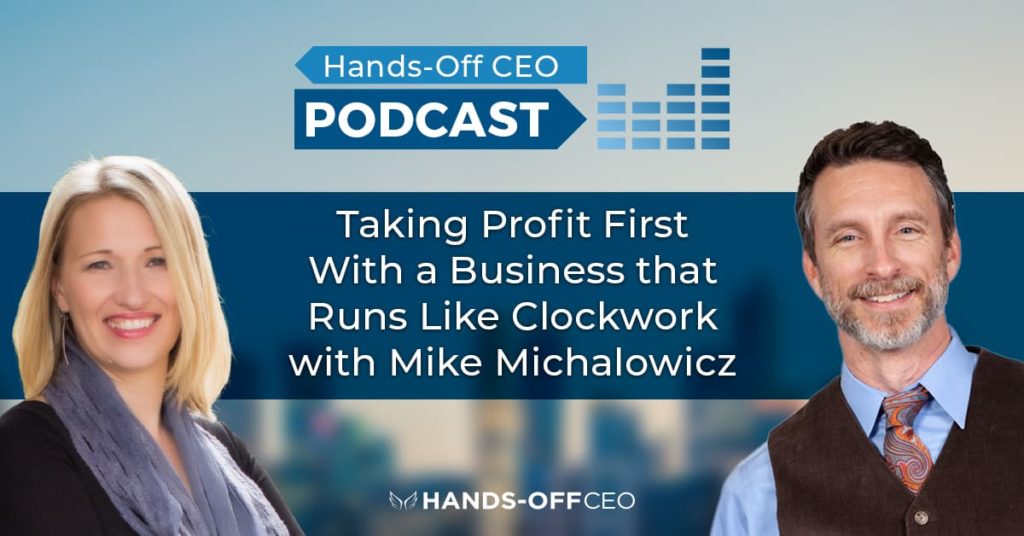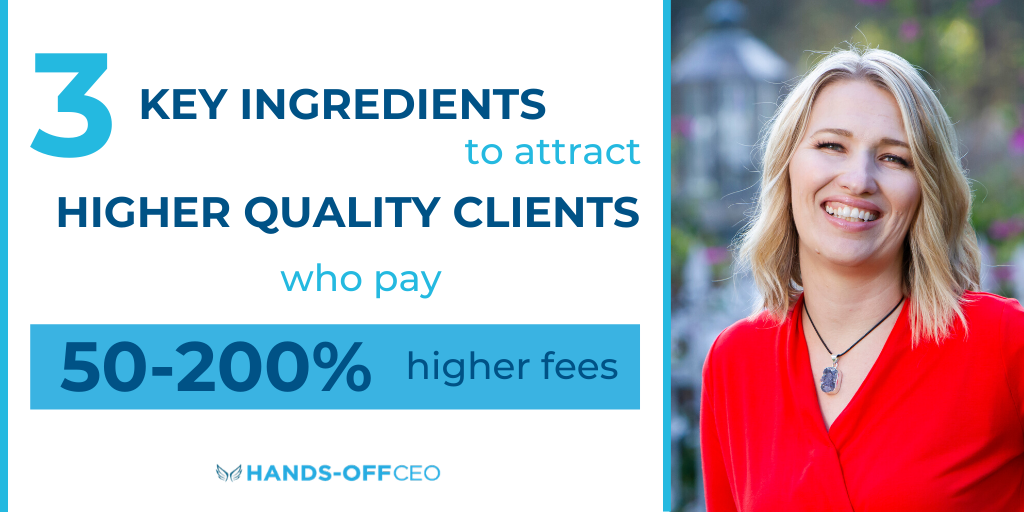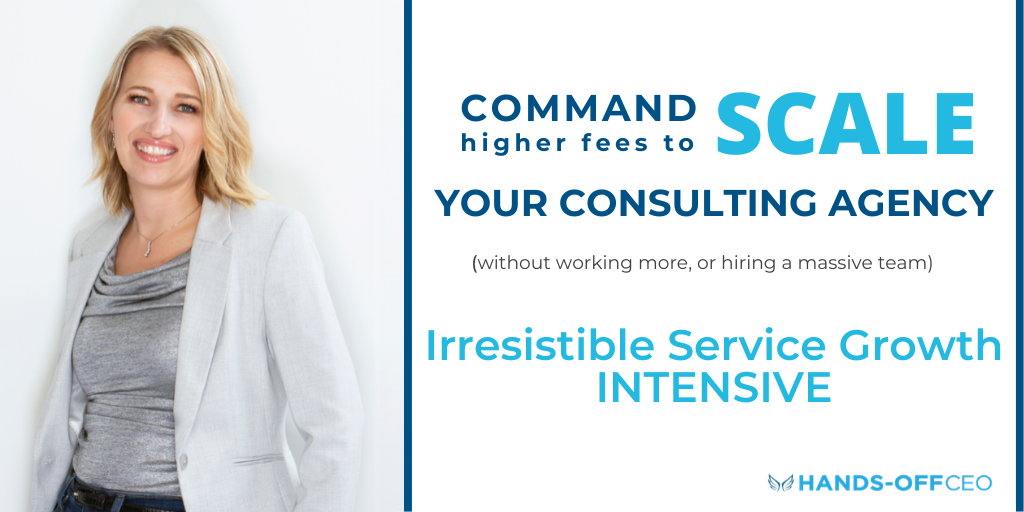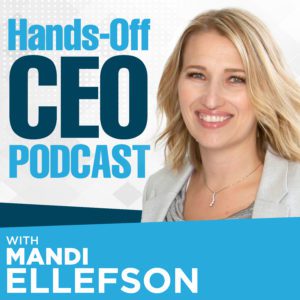
Taking Profit First With a Business that Runs Like Clockwork with Mike Michalowicz – E18
In this episode, Mike and Mandi dish about taking Profit First in a business that runs like Clockwork. Mike has a lot of great knowledge and expertise to share and does it in a very down to earth entertaining, engaging kind of way. He helps us really isolate the most important pieces in our business so that it can run without you.
ProfitFirst: Reverse Engineering Profitability
We’ve all been taught that profit comes last when managing your business finance:
Sales – Expenses = Profit.
We even use phrases that indicates that profit comes last.
Profit = Bottom Line = Year End
While logically, this makes sense, behaviorally it’s wrong.
With ProfitFirst, we flip the formula: sales minus profit equals expenses. By doing this, we know that what’s important is the growth of the organization through sales and the health of the organization. What’s left over after subtracting profits is available to provide for the expenses in the operations of the business.
How do we do this? Every time a sale comes in, we immediately assign it specific responsibilities by moving it to five foundational accounts. It’s a form of reverse engineering profitability.
How can we apply the principles of ProfitFirst to maximize productivity in addition to profitability?
Consider Parkinson’s Law: work expands so as to fill the time available for its completion. When the resource (whether it’s time or money) expands in availability, it’s our human nature to consume more of the resource.
To impact the productivity of your team:
- Amplify the amount of work responsibility they have (but be careful with this one)
- Hire part-time labor: part-timers often accomplish 8 hours of work within 3-4 hours and then recharge outside of their work time. And remember, for A-player employees, money is not always the primary motivator.
What’s the most important leading indicator?
First ask yourself: what’s the core function (QBR = Queen Bee Role) of the business and how well are we performing that function? Your measurement of how well you’re performing the QBR is your most important leading indicator.
Once you know the QBR of your business, the owner needs to remove himself from that function while still keeping an eye on it. Thinking is the most important element of the CEO’s role. Aspire to be an extraordinary thinker.
The true responsibilities of a CEO include the vision for the business and the organization of the resources. It really comes right down to your vision of what you want to create with your business.
Speaking of Vision: Eradicating Entrepreneurial Poverty
When an entrepreneur starts a business, friends and family often assume that you’re flush with cash and sitting on the beach somewhere. The reality is that you have no money and you’re working your tail off. So there’s this gap I call entrepreneur poverty.
I believe entrepreneurs deserve to be wildly successful and have all the time in the world. Because if we do that, we empower our employees, our communities, and our world to have that same experience.
Do you suffer from the Superhero Syndrome?
Often, business owners feel that you need to carry the business on their back – that the harder they work, the more the business will grow. And the funny thing is, for a very small business, that’s actually true for a period of time. If you work harder and longer, you will generate more revenue and the business will grow.
But at a certain point, we start getting diminishing returns. Because we are working so hard that we’re exhausting ourselves, we’re start making errors. We haven’t built systems. If we get sick, the business dies.
Let’s take Superman as an example. Our plan to protect ourselves on Earth is to ask Superman to help us. Yet, Superman is actually disabling the military and the police from protecting us. He’s actually causing an unhealthy dependency I call the superhero syndrome.
In addition, while the superheroes are saving the world, they’re causing mass destruction and leaving a wake of damage. In a similar way, we’re superheroes to our business. We swoop in and save the day, leaving a wake of damage behind us that our employees need to recover from.
The goal of Clockwork is to defeat that superhero syndrome. Our work is NOT to be superheroes but to be a Super Visionary with clarity about the desired outcome and an ability to choreograph the resources to get there. The Super Visionary empowers the team to carry the load.
How is Clockwork Different from The E-Myth?
I spoke with Michael Gerber at a dinner recently, and shared with him that I think The E-Myth is a Bible for entrepreneurship. I explained though, that I had understood the book as describing the flipping a switch between working IN and working ON the business. I said, I don’t think it’s a switch.
I think it’s a throttle. (And then he said some choice words, but in a loving fun way.) We talked about Clockwork and how it shows you how to adjust the throttle in order to extract you from the business.
We all often refer to our business as our “baby” – in a sense, a parent child relationship. I believe that’s a fatally flawed analogy. I think it’s conjoined twins. We start the business and we share a spinal stem, hearts and lungs, a soul. Therefore disconnecting from our business is a very slow, methodical surgical process. You can do it – they separate conjoined twins – but you need to very slowly separate in a throttling process. And that’s what I explain in Clockwork.
Someday…
If you’re always running your business as if “we’ll get there someday” it’s never enough and you’re running this ‘never enough’ pattern. Even when you have a multiple seven figure company that’s very successful, very profitable, you’re still not happy with it. It’s not good enough. It will never be good enough.
I think it’s human nature. I never want to be satisfied in what keeps driving me on to the fulfillment of my ultimate vision. Radical entrepreneur poverty is so big for me that it energizes me every single day. It’s such a big goal that I will get I get fulfillment of the pursuit of it.
I am very energized, excited about the the that big mission and seeing momentum toward it. I get excited about my colleagues and others embracing it too, and seeing that become more than me.
I don’t see that as from any place of lack. You’re you’re growing it from this place of abundance and asking “how much more value can we add?”
Two Kinds of Marketing
You’ve done a really fantastic job of promoting your books, too. I’ve noticed you have you have hundreds of reviews, and they’re all five star reviews and and that that goes to show that you’re you’re really good at marketing your business and your ideas.
About 10 years ago, I said I’m going to I’m going to market this aggressively, not manipulatively, but aggressively. If someone is in need of entrepreneurial help, and they’re looking at a program, another book or my book, and I truly, authentically believe that my book is the best to serve them. I have responsibility to shout from the rooftops “this will serve you.” That’s why I market so much. And when you market a lot, then you can pick and choose who you want to work with.
I believe there’s persuasive marketing and manipulative marketing. The difference is very subtle, Persuasive marking is where a prospect is at point A, and their best interest is to go to point B, but they are terrified of this. We use persuasive tactics, motivation, and so forth to move into point B, knowing is truly in their best self interest.
Manipulative marketing sees the prospect at point A, and moves them to point C, even though we know that this is not in their best interest. It’s intentionally to the advantage of the person selling but to the known disadvantage of the client. And that really gets me irritated! So I use persuasive techniques to move people to serve them, even if they’re afraid of doing it. I have a responsibility to help them navigate that bridge.
Find Mike:
https://www.facebook.com/MikeMichalowiczFanPage/
https://twitter.com/MikeMichalowicz
https://www.instagram.com/mikemichalowicz/
Leave a review
If you’re finding a lot of value from this podcast, please leave a review on iTunes!






